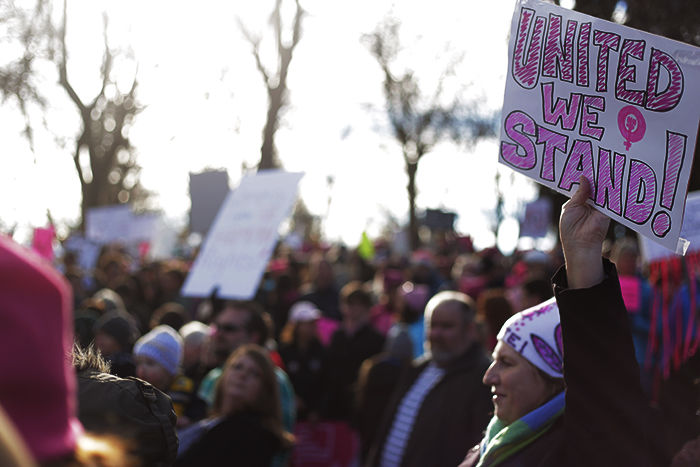We must fight for everybody
January 31, 2017
Women, afraid of being grabbed in their private places without consent, afraid of having their rights snatched by the recent political changes, came out in droves last Saturday. The most powerful presence was the thousands of white women who flooded the streets draped in pink as a symbol of feminism.
Along with them were women of color, queer people and allies who had been fighting for their own agencies since forever.
If I may quote the rapper Future “where your a– was at…” when marginalized groups were forced to advocate for themselves without the power of numbers or privilege? Like the privilege of having a peaceful march, un-antagonized by police in military gear or tear gas. The privilege to have adequate media coverage of their march because their cause was deemed worthy enough.
Although there were surely plenty of white women at the march who have always been allies of other groups, most of them were women who up until this point had been complacent with injustices against groups with which they do not identify.
The 53 percent of white women who voted for Trump were not only inspired by his rhetoric, but also encouraged by the silence of some of their undercover liberal family members, friends and colleagues.
Historically, the focus of feminist movements and policies has been on the struggles of white women while ignoring the distinct needs of women of color and other underprivileged groups.
“There is and always has been white women who aren’t concerned with or aren’t exposed to issues regarding women of color, trans-women, gay women, etc.,” double major in comparative ethnic studies and women’s studies Elizabeth McKay said. “They go to these marches with the main purpose of representing white women, even if they aren’t aware of it.”
That is to say that these white women who consider themselves liberal may not be aware of the different ways they exclude other groups and their agencies. They are operating under the assumption that other women aren’t experiencing other forms of oppression on behalf of other parts of their identity like their race, religion or sexual orientation.
In this way, they are missing the component of intersectional perspective.
This phenomenon is discussed in Kimberlé Crenshaw’s theory of intersectionality as well as in works by feminist Audre Lorde. Both authors depict the exclusionary politics that exist within feminist movements.
It’s incredible to see women of all backgrounds banding together for such an important cause. However, we must all remember that all systems of oppression are connected. Therefore, coming out to march against misogyny and sexual assault means also coming out to protest police brutality, hate crimes against trans-folk and islamophobia.
“You can’t call yourself a feminist if you are only representing your oppression, you have to fight the fight for everyone,” McKay said. “As a white woman, I think that if we stop fighting just for ourselves and start fighting for others, we can accomplish things that actually matter.”
While this march was a powerful gesture of resistance toward the current administration, I can’t help wondering how much farther along we would be in issues of social justice if members of dominant society showed up to the causes of all the underdogs in our society.
As women, we are stronger together when we stand against all oppression simultaneously.
Basheera Agyeman is a junior comparative ethnic studies major from Accra, Ghana. She can be contacted at 335-2290 or by [email protected]. The opinions expressed in this column are not necessarily those of the staff of The Daily Evergreen or those of The Office of Student Media.

















